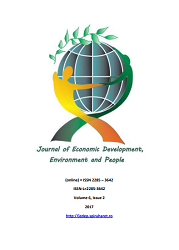Does Primary and Secondary Education Contribute to Short and Long-term Economic Growth in South Africa
Does Primary and Secondary Education Contribute to Short and Long-term Economic Growth in South Africa
Author(s): Martha MatashuSubject(s): National Economy, School education, Economic development, Socio-Economic Research
Published by: Editura Fundaţiei România de Mâine
Keywords: Short run; Long run; Primary and Secondary education; Economic growth; South Africa; Autoregressive Distributed Lag;
Summary/Abstract: The human capital school of thought considers education in primary and secondary education as the foundation for the development of human capital that promotes economic growth. Persuaded by an empiricist paradigm this study used an Autoregressive Distributed Lag (ARDL) bounds testing analysis was conducted to examine the short and long run relationship between education and economic growth in South Africa. Economic growth, primary and secondary education data from 2002 to 2018 was used. The diagnostic tests revealed that variables are integrated at order level 1. The cointegration of the examined variables is confirmed by an ARDL bound test. Error Correction Model test found that, primary school, government expenditure on primary education has a significant relationship with economic growth in the short term but has no contribution in the long term. Drawing on the insignificant contribution of both primary and secondary education in the long it can be concluded that these education phases appear not to matter for economic growth in South Africa. This study thus recommends that primary and secondary school education should be restructured to align the curriculum with potentially productive sectors to improve its potential contribution to economic growth.
Journal: Journal of Economic Development, Environment and People
- Issue Year: 12/2023
- Issue No: 2
- Page Range: 82-95
- Page Count: 14
- Language: English

